Neighborhood policy focal point of Raisi administration: top diplomat

TEHRAN- Deputy Foreign Minister for Political Affairs Ali Bagheri Kani on Thursday praised the foreign policy of Iranian President Ebrahim Raisi’s administration, saying that ties with countries including neighbors are on the rise.
At the beginning of the Raisi administration, Iran’s relations with the two countries of Saudi Arabia and Bahrain had been cut, and Kuwait and the UAE did not have ambassadors in Iran, Bagheri Kani said.
“The strengthening of neighborly policy made the government of Kuwait introduce a new ambassador and the government of the United Arab Emirates returned its ambassador to Tehran, and relations with Saudi Arabia were also established,” he stated.
Bagheri Kani went on to stress that the government’s approach in the past two years gives a clear picture of its vision and understanding of foreign policy.
He categorized the main components of Raisi’s foreign policy in at least three political, economic and international fields.
“In the political arena, the most important characteristic of the government is to prioritize neighborhood policy. The neighborhood policy is the starting and jumping point of the government’s foreign policy,” he pointed out.
Given the foreign policy component of the Raisi administration, Bagheri Kani noted, “In the economic field, it is necessary to criticize and activate various capacities, the most important, central and fundamental of which is the issue of international crossings and corridors.”
On economic measures, he pointed to the development of Chabahar port, the North and South corridors and actions taken to develop rail and road transportation. “In the geographical area of the country, these issues can be the components and cores of internal developments.”
He also stated, “In the international field, the most important core of the government’s foreign policy is an optimal placement of Iran in the international arena for a more active and effective role in regional and international relations.”
Regarding Iran’s frozen assets, he said that the Islamic Republic no longer has blocked funds in other countries due to U.S. sanctions as funds frozen in banks in South Korea and Iraq were released following an agreement with Washington.
Bagheri Kani went on to say that Iran now has full control over its assets in other countries and can transfer them between foreign banks by its own choosing.
According to Bagheri Kani, the looming prisoner swap with the U.S. involves the release of Iranian funds held in Iraq as well as the release of $6 billion held in South Korea.
“The issue of funds in Iraq was also raised in the understanding reached with the Americans and the process for their release has also started,” the diplomat averred.
He said that a sizeable portion of its money in Iraq has already fallen into the hands of Iran.
However, Bagheri Kani stated that Iran has opted to hold certain other funds in specific countries in order to use them for economic exchanges with those countries or third parties.
“We have no more blocked funds. We receive the interest of the funds held abroad and use them for exchanges with countries and even transfer them to other areas for financing our purchases,” Bagheri explained.
The comments were made two weeks after Iran and the U.S. said they had agreed to exchange prisoners and secure the release of Iranian cash that had been held in two South Korean banks since 2018 due to U.S. pressure on Seoul.
Given Iran’s membership in BRICS and Shanghai Cooperation Organization (SCO), he said that serious attempts are being made to return Iran to its rightful place in international relations.
On Thursday, South African President Cyril Ramaphosa officially announced that Iran Argentina, Egypt, Ethiopia, the UAE and Saudi Arabia will join BRICS as of January 1, 2023.
Referring to the long time it took for Iran to become a member of the SCO in the previous administrations, Bagheri said, “A short time had passed from the time that Iran decided to become a member of BRICS until this action took an operational form. The reason was that the potential of Iran became clear for international institutions and developed the necessary mechanisms for synergy with international organizations as well. Joining BRICS showed that Iran is willing to pursue its interests based on its own endogenous interests.”
Iran’s chief negotiator also said that a feature of the Raisi administration’s foreign policy is that it has defined a win-win game for the countries of the region in political, security and economic fields, which makes the neighborhood policy fruitful.
He continued, “In the last two years, we have achieved stable relations with the countries of the region.”
“The process that was established in Esfand of last year in Beijing to normalize the relations between Iran and Saudi Arabia would have lasted for several years under normal conditions, but the political will of the leaders of the two countries and the experience of the countries in the region from the anomalies of foreign interference led to a collective rationality in the region and caused the policy of neighborhood as a strategy for the stability and security of the regional countries,” Bagheri Kani underscored.
Leave a Comment